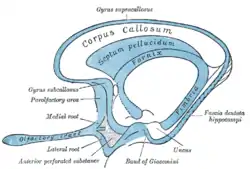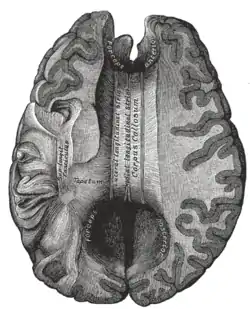Indusium griseum
The indusium griseum, (supracallosal gyrus, gyrus epicallosus) consists of a thin membranous layer of grey matter in contact with the upper surface of the corpus callosum and continuous laterally with the grey matter of the cingulate cortex.
| Indusium griseum | |
|---|---|
 Scheme of rhinencephalon. (Indusium griseum labelled as gyrus supercallosus at center top.) | |
 Corpus callosum from above. | |
| Identifiers | |
| NeuroNames | 173 |
| NeuroLex ID | birnlex_1316 |
| TA98 | A14.1.09.246 |
| TA2 | 5526 |
| FMA | 62488 |
| Anatomical terms of neuroanatomy | |
On either side of the midline of the indusium griseum are two ridges formed by bands of longitudinally directed fibers known as the medial and lateral longitudinal striae.[1]
The indium griseum is prolonged around the splenium of the corpus callosum as a delicate layer, the fasciolar gyrus,[2] which is continuous below with the surface of the dentate gyrus. Toward the genu of the corpus callosum it curves down along the rostrum to form the subcallosal gyrus.[3]
References
This article incorporates text in the public domain from page 827 of the 20th edition of Gray's Anatomy (1918)
- Di Ieva, A; Fathalla, H; Cusimano, MD; Tschabitscher, M (January 2015). "The indusium griseum and the longitudinal striae of the corpus callosum". Cortex. 62: 34–40. doi:10.1016/j.cortex.2014.06.016. PMID 25091482. S2CID 1246791.
- "fasciola cinerea". TheFreeDictionary.com.
- Naidich, Thomas P.; Castillo, Mauricio; Cha, Soonmee; Smirniotopoulos, James G. (31 October 2012). Imaging of the Brain, Expert Radiology Series,1: Imaging of the Brain. Elsevier Health Sciences. ISBN 978-1416050094.
External links
- Atlas image: n1a5p10 at the University of Michigan Health System